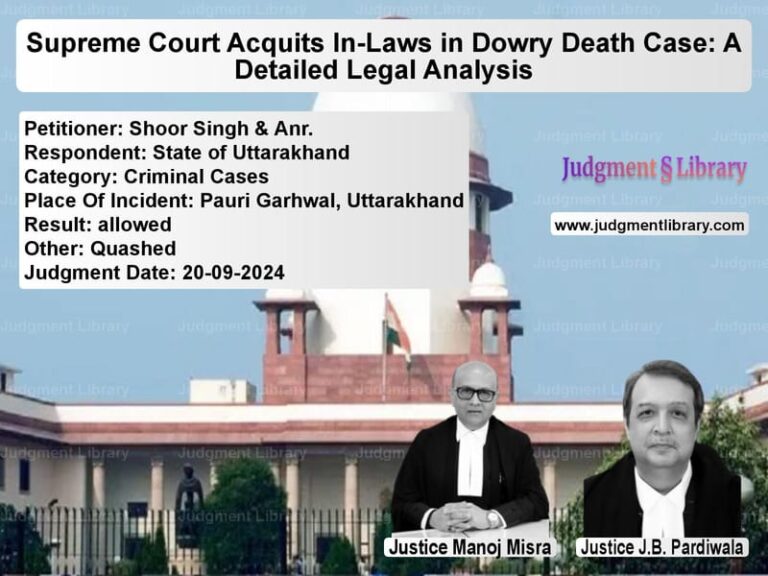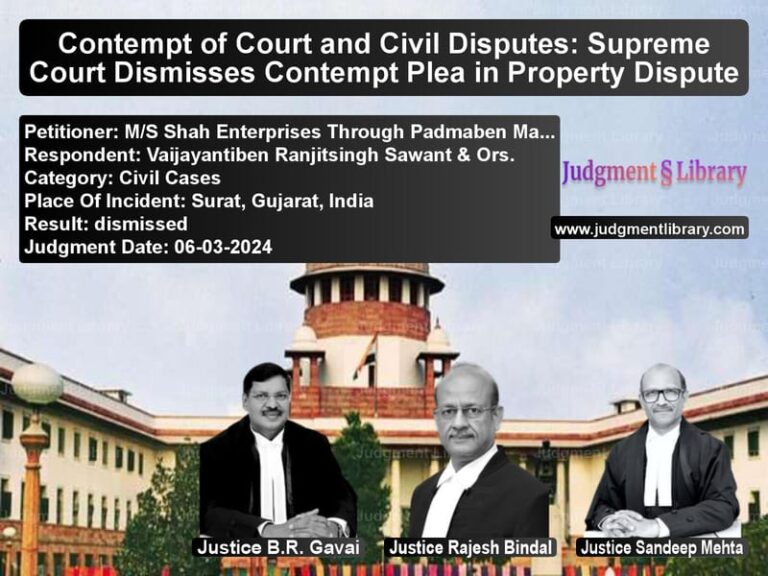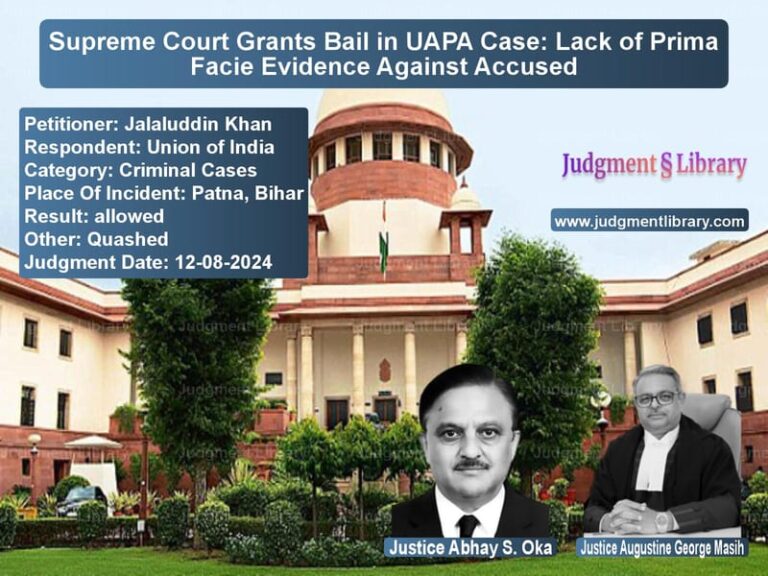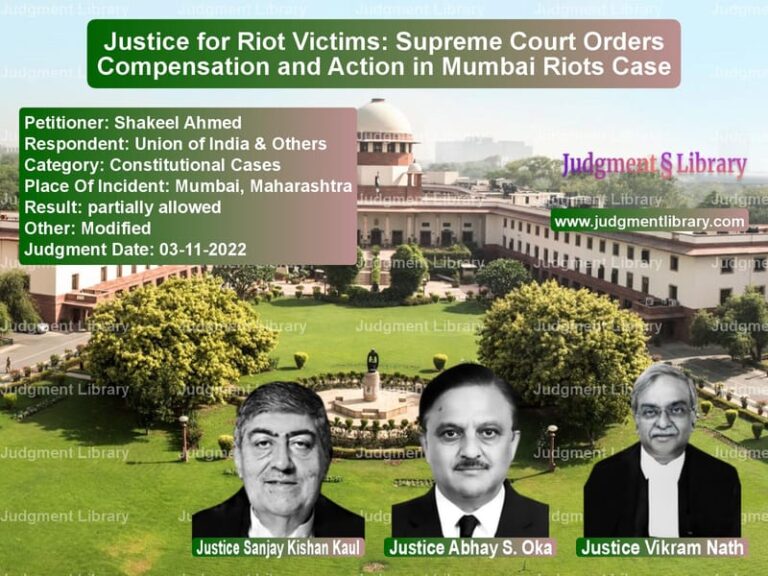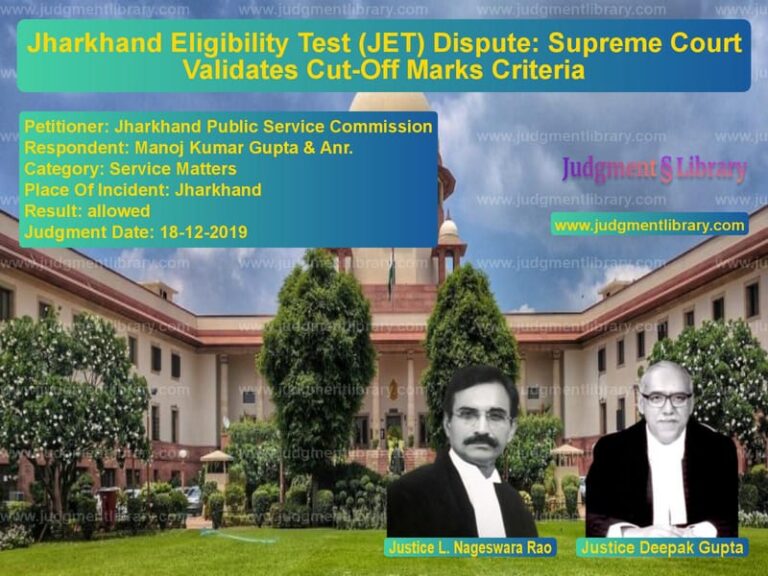Beheading Murder Case: Supreme Court Upholds Life Imprisonment
The Supreme Court of India, in the case of Subhash Mahto vs. State of Bihar, upheld the life sentence of the appellant, who was convicted for his involvement in a brutal murder where the victim was beheaded in a public place. This judgment reinforces the principle that heinous crimes will be met with the strictest legal consequences and emphasizes the role of eyewitness testimony in criminal trials.
Background of the Case
The case arose from an incident on 1 October 1988, in Begampur Mandai Mohalla, Bihar. The victim, Ramanand Mahto, was traveling home on a scooter with two companions when they were ambushed by a group of men, including the appellant, Subhash Mahto. The prosecution alleged that the accused:
- Blocked the victim’s way and prevented his escape.
- Held the victim down while two of the accused, Ramachandra Gareri and Lachhu Gareri, attacked him with sharp weapons (Bhujali and Dab).
- After the victim succumbed to his injuries, the accused severed his head and placed it in a plastic bag.
- The accused then dragged the headless body and dumped it into a ditch.
- When eyewitnesses approached, the accused fled, carrying the severed head.
Following the incident, an FIR was lodged, leading to the trial of multiple accused under Section 302 IPC (murder) and Section 201 IPC (destruction of evidence).
Trial Court Verdict
The Trial Court, based on the testimony of eyewitnesses and forensic evidence, convicted:
- Ramachandra Gareri and Lachhu Gareri under Section 302 IPC for carrying out the murder.
- Other accused, including Subhash Mahto, under Section 302 read with Section 34 IPC for aiding the crime.
- All were sentenced to life imprisonment.
The accused then filed an appeal in the Patna High Court.
High Court’s Judgment
The High Court reviewed the evidence and delivered the following rulings:
- Acquittal of three accused (Anant Lal Mahto, Rishi Mahto, and Asmani Mahto) due to lack of evidence.
- Confirmation of conviction for other accused, including Subhash Mahto, citing strong eyewitness accounts.
- Reaffirmation of life imprisonment for those found guilty.
Arguments Before the Supreme Court
Petitioner’s Arguments (Subhash Mahto)
The appellant, Subhash Mahto, challenged his conviction on the following grounds:
- He was not the main perpetrator but merely present at the scene.
- The prosecution failed to provide conclusive evidence linking him to the act of murder.
- Several co-accused were acquitted, despite being similarly placed.
- Since the appeal of other acquitted accused was not challenged, his conviction should also be reconsidered.
Respondent’s Arguments (State of Bihar)
The State defended the conviction, arguing:
- Eyewitnesses consistently identified Subhash Mahto as one of the men restraining the victim.
- The severity of the crime justified the maximum penalty.
- The appellant played an active role in the murder, as he caught hold of the victim while others beheaded him.
- The defense failed to provide any counter-evidence to dispute the prosecution’s claims.
Supreme Court’s Observations
The Supreme Court, after carefully analyzing the evidence, ruled:
- “The accused played an active role in restraining the deceased while the attack took place.”
- “The act of carrying away the severed head indicates a clear intention to instill fear and conceal evidence.”
- “Eyewitness testimonies are consistent and corroborate the sequence of events.”
- “There is no reason to interfere with the High Court’s judgment, as it is based on credible evidence.”
Final Judgment
The Supreme Court dismissed the appeal and ruled:
- The conviction under Section 302 IPC was confirmed.
- The life imprisonment sentence was upheld.
- The Supreme Court refused to entertain any plea for leniency due to the brutal nature of the crime.
Impact of the Judgment
This ruling has significant legal implications:
- Eyewitness testimony is crucial in securing convictions in violent crimes.
- Common intention (Section 34 IPC) can be used to convict those who aid and abet a crime.
- Brutality of crime influences sentencing, leading to severe punishment.
- The Supreme Court prioritizes deterrence over leniency in heinous crimes.
By upholding the life sentence, the Supreme Court sent a strong message that organized and brutal crimes will be met with the harshest legal consequences.
Petitioner Name: Subhash Mahto.Respondent Name: State of Bihar.Judgment By: Justice R. Banumathi, Justice Indira Banerjee.Place Of Incident: Bihar.Judgment Date: 19-09-2018.
Don’t miss out on the full details! Download the complete judgment in PDF format below and gain valuable insights instantly!
Download Judgment: Subhash Mahto vs State of Bihar Supreme Court of India Judgment Dated 19-09-2018.pdf
Direct Downlaod Judgment: Direct downlaod this Judgment
See all petitions in Murder Cases
See all petitions in Bail and Anticipatory Bail
See all petitions in Custodial Deaths and Police Misconduct
See all petitions in Judgment by R. Banumathi
See all petitions in Judgment by Indira Banerjee
See all petitions in dismissed
See all petitions in supreme court of India judgments September 2018
See all petitions in 2018 judgments
See all posts in Criminal Cases Category
See all allowed petitions in Criminal Cases Category
See all Dismissed petitions in Criminal Cases Category
See all partially allowed petitions in Criminal Cases Category


